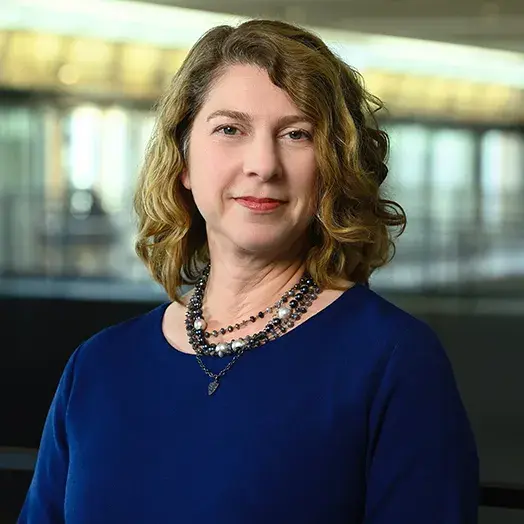AACSB counts Sutcliffe as one of only 25 awardees for her research’s impact on society.

World’s most prestigious business-school-accrediting organization honors Johns Hopkins Carey Business School’s Sutcliffe for influential research
Rigorous and transformational insights into patient safety failures, commercial aviation dangers, and the best ways to build resilient teams before a crisis hits—they’re just three of the reasons the Association to Advance Collegiate Schools of Business has named Johns Hopkins Carey Business School Professor Kathleen Sutcliffe to its 2024 Class of Influential Leaders.
This year, AACSB focused on exceptional business school faculty who “are advancing new knowledge and creating impact in business and society through their research.” The organization honored 25 faculty, from across more than 1,700 business schools worldwide.
"I'm honored to be recognized for rigorous and relevant research that has had meaningful impact,” Sutcliffe said. “This wouldn't have been possible without my various and remarkable collaborators and, of course, people around the world who have found value in the ideas."
Patient safety
Sutcliffe’s work in patient safety led in part to the 2019 Oxford University Press publication of Still Not Safe: Patient Safety and the Middle Managing of American Medicine with co-author Robert L. Wears, MD. The book details and discusses the ways the modern health care system has failed to prevent patient harm, pulling together traditional epidemiological research, social science research, and dramatic personal accounts to offer a compelling critique of what has become known as the patient safety movement.
As a Bloomberg Distinguished Professor, Sutcliffe holds appointments not only at the Carey Business School, but at three other Johns Hopkins schools: the Schools of Medicine and Nursing, and the Bloomberg School of Public Health. She’s also appointed to the Armstrong Institute for Patient Safety and Quality. As a result, she is routinely in contact with health care practitioners, fostering knowledge and access through which she can apply multiple research methods to societally relevant questions.
But while her expertise readily lends itself to the business of health, her impact reaches into other high-stakes operations. She has investigated organizational safety, high reliability, and resilience practices in oil and gas exploration and production, chemical processing, steel production, and wildland firefighting.
A focus on practice
Sutcliffe’s research examines two broad elements of high-performing organizations: organizational reliability, safety, and resilience and how the organization’s design affects the ability to deal with unexpected events and uncertainty; and how top executive teams interact in organizational processes like sensemaking, decision-making, and learning.
“This is a richly deserved recognition for Dr. Sutcliffe,” said Carey Vice Dean for Faculty and Research Goker Aydin. “She has produced seminal work on how health care organizations can improve patient safety through better organizational design. She is an extremely well-published and well-cited scholar, but her scholarship also stands out because it is so firmly grounded in practice. The scope and scale of her work, and the collaborative way she engages with others to ask important questions and seek meaningful, actionable answers, allow Dr. Sutcliffe’s work to resonate with practitioners.”
In 2021, Sutcliffe was appointed by the National Academy of Sciences, Engineering, and Medicine Transportation Research Board to serve on the board’s Emerging Trends in Aviation Safety Committee. That committee released its first-year findings in a 2022 report, Emerging Hazards in Commercial Aviation: Initial Assessment of Safety Data and Analytics Process—the first of six scheduled reports on the topic.
What to Read Next

research
‘Struggling well’: Lessons for the business world from adventure racingIn recent research published in the Journal of Contingencies and Crisis Management, Sutcliffe and fellow Carey researcher Michelle Barton studied 53 adventure racing teams to find out how resilience unfolds in real-time rather than after a crisis. That study led to observations around engagement, “redistribution of strain,” “recombination of resources,” and “reframing adversity” that can serve as practical lessons in building a crisis-stable organization starting before a disruptive flashpoint.
“Dr. Sutcliffe embodies the ethos of an impactful, research-based business school in producing research that goes beyond discovery and into practice,” said Carey Business School Dean Alex Triantis, who also serves as the chair of the AACSB board of directors. “Her dedication to making the world a better place by understanding and transforming organizational behavior is second to none. We are so fortunate to count her as a Carey colleague and very pleased she has received this impressive recognition.”
The AACSB formally announced Sutcliffe and her fellow awardees on April 8.


